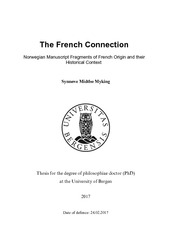| dc.contributor.author | Myking, Synnøve Midtbø | |
| dc.date.accessioned | 2017-02-28T14:06:04Z | |
| dc.date.available | 2017-02-28T14:06:04Z | |
| dc.date.issued | 2017-02-24 | |
| dc.identifier.isbn | 978-82-308-3114-4 | |
| dc.identifier.uri | https://hdl.handle.net/1956/15566 | |
| dc.description.abstract | This thesis examines medieval Latin manuscript fragments of French origin in the Norwegian National Archives. The fragments in the Archives’ collection come from parchment manuscripts that were cut up and repurposed, used primarily as binding material for tax accounts in the 16th and 17th centuries. Few Norwegian medieval manuscripts have survived intact, and the fragments are therefore a valuable source for the scholar seeking to investigate early Norwegian book culture. The aim of the thesis has been twofold: to identity and examine the fragments of French origin, and to examine the context in which books could be brought from France to Norway in the Middle Ages. The identification and examination of fragments from Latin manuscripts of French origin shows that there is a correlation between the fragments and what the historical sources tell us of French-Norwegian connections in the Middle Ages: the number of French-origin fragments that can be dated prior to 1150 is relatively modest compared to those that can be dated to the second half of the 12th century or later. This corresponds to a growing amount of evidence of French-Norwegian contacts: Norwegians travelling through France, Norwegians studying in Paris, Norwegian clergy and court members interacting with their French peers, and French influence on Norwegian church organisation, liturgy, and literature. The manuscript fragments are challenging to work with, as they are only pieces from what used to be entire books. Still, the overarching impression of the material is that it reflects connections that were created and maintained by religious ties, diplomatic and political ties, and intellectual ties between France and Norway from the 11th to the 14th centuries. | en_US |
| dc.description.abstract | Denne avhandlinga tek føre seg fragment frå mellomalderhandskrifter med fransk opphav i Riksarkivet. Fragmentsamlinga i Riksarkivet kjem frå bøker skrivne på pergament, som vart skorne opp og brukt til andre føremål, hovudsakleg som innbindingsmateriale for skattelister på 15- og 1600-talet. Få norske mellomalderhandskrifter har overlevd i intakt tilstand, og fragmenta er difor ei viktig kjelde for den som vil forska på tidleg norsk bokkultur. Målet for avhandlinga har vore todelt: å identifisera og undersøkja fragmenta med fransk opphav, og å undersøkja konteksten for korleis bøker kunne takast med frå Frankrike til Noreg i mellomalderen. Identifiseringa og undersøkinga av fragmenta frå latinske mellomalderhandskrifter av norsk opphav viser at det er ein korrelasjon mellom fragmenta og det historiske kjelder fortel oss om fransk-norsk samkvem i mellomalderen: talet på franskætta fragment som kan daterast til før 1150 er relativt lågt samanlikna med dei som kan daterast til andre halvdel av 1100-talet eller seinare. Dette svarer til ei aukande mengd av opplysingar om fransk-norske kontaktar: nordmenn som reiser gjennom Frankrike, nordmenn som studerer i Paris, norske geistlege og aristokratar som omgåst franske likemenn, og fransk påverknad på norsk kyrkjeorganisasjon, liturgi og litteratur. Handskriftsfragmenta byd på utfordringar, sidan dei er berre bitar av det som ein gong var heile bøker. Alt i alt gjev likevel materialet det inntrykket at det speglar relasjonar som vart skapte og haldne ved like gjennom religiøse band, diplomatiske og politiske band, og intellektuelle band mellom Frankrike og Noreg frå tida etter kristninga til tidleg 1300-tal. | en_US |
| dc.language.iso | eng | eng |
| dc.publisher | The University of Bergen | eng |
| dc.title | The French Connection: Norwegian Manuscript Fragments of French Origin and their Historical Context | eng |
| dc.type | Doctoral thesis | |
| dc.rights.holder | Copyright the author. All rights reserved. | eng |
